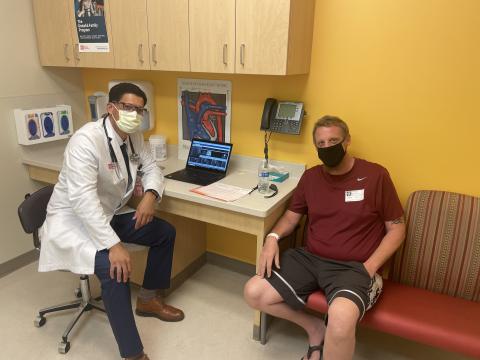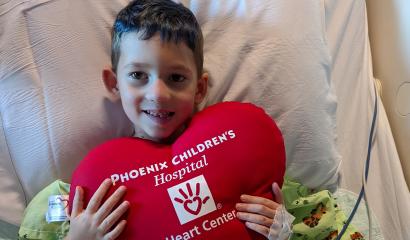Bright Futures
Articles and Updates from Phoenix Children's
After being diagnosed with pulmonary valve regurgitation (leakiness) this past year, Abraham became the first patient in Arizona to receive the HarmonyTM transcatheter pulmonary valve (TPV) at Phoenix Children’s Heart Center.
For many patients like Abraham, the Harmony valve allows for a minimally invasive procedure that is designed to help fix a leaky pulmonary valve and defer the need for heart surgery.
What is the Harmony valve?
The Harmony valve became the first TPV to be approved by the FDA in March 2021. It treats patients with severe pulmonary regurgitation, which occurs when the pulmonary valve allows blood to leak back to the heart chamber before it gets to the lungs.
During implantation of the Harmony valve, a catheter containing the valve inside is inserted through a vein in the groin or in the neck and is then pushed up to the heart. Once it is in place, the valve is released from the catheter and expands like a balloon. From there, it functions as the patient’s new pulmonary valve.
Pulmonary regurgitation can occur in adults with certain heart conditions who underwent open heart surgery as children, which was the case for Abraham.
Open heart surgery for Tetralogy of Fallot
Abraham was born with Tetralogy of Fallot, a rare heart defect that affects normal blood flow through the heart. It is made up of four separate defects: narrowing of the pulmonary artery, ventricular septal defect, an overriding aorta, and enlargement of the right ventricle.
Children who are born with this congenital heart defect need surgery soon after they are born. Sometimes, the patient will need to undergo more surgeries in their adult lives if complications arise.
In 1986, Abraham had open-heart surgery for this defect in his hometown of Kodiak, Alaska. He was one and a half years old at the time. After his surgery, he describes his childhood as fairly typical with regular check-ups and no further health complications.
He and his family moved to Arizona when he was 10 years old. It wasn’t until this year that he began experiencing symptoms such as lack of sleep, irritability, and heart palpitations.
Arriving at Phoenix Children's ACHD Program
Concerned, he began doing some research and made an appointment with the Adult Congenital Heart Disease Program at Phoenix Children’s.
Though this would be his first time as a patient, he was no stranger to the high-quality offered at the hospital.
Abraham credits the medical staff at Phoenix Children’s for saving his child’s life when he was seven months old and had a build-up of fluid in the brain (hydrocephalus) that had to be drained. To this day, he is still receiving care at the hospital and describes him as a healthy and happy seven-year-old boy.
The experience Abraham’s family has had with Phoenix Children’s has established a strong sense of trust, which pushed him to choose the ACHD Program for his own personal care.
Once Abraham was seen by ACHD cardiologists, they were able to confirm through several tests and cardiac imaging that he had developed a regurgitant pulmonary valve over the years.
Before the Harmony TPV was approved by the FDA in March 2021, patients with this diagnosis would have to undergo heart surgery to replace the leaky pulmonary valve. Now, this minimally invasive procedure allows them to defer the need for surgery at all.
Becoming the first patient to receive the Harmony valve
Abraham was informed he would be the first patient to receive the Harmony TPV in Arizona, and though this made him nervous, he says Dr. Wayne J. Franklin and the cardiology team assured him of the safety and effectiveness of the Harmony valve.
“Dr. Franklin actually turned around and squashed my concerns. He told me about the pulmonary testing, the trials and everything that was done to make sure that it [Harmony Valve] would work properly. That helped ease me up.”
Abraham was also made aware of the side effects and possible complications that could occur after his TPV placement, including irritation, soreness, bruising and infection.
He did experience slight soreness the first week after his procedure but began feeling better the week after and was able to return back to work soon after.
Abraham’s recovery
Abraham has been in great health ever since his procedure. He has been able to return back to his normal self and has noticed a much higher quality of sleep and overall better mood.
He had a follow-up appointment in October with Dr. Franklin, and his x-rays showed no complications with his Harmony valve.
He expresses his gratitude for Phoenix Children’s, and though he admits it can be a bit strange to be treated at a children's facility as an adult, he has nonetheless experienced high-quality care from everyone he has come into contact with.
“The people at Phoenix Children’s are awesome. Thank you for being kind and doing your job in the best way possible.”
Learn more about the transcatheter pulmonary valve implantation here.



